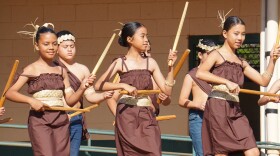The state is grappling with the detection of avian flu and its potential jump from species to species. And about 125 years ago, the bubonic plague made its way into Honolulu.
A rat harboring a disease-carrying tick or flea likely brought it over on a ship. Its first victim in the city was You Chong, a Chinese bookkeeper whose office was upstairs in a building on Nuʻuanu Avenue across from what we know today as Murphy's Bar and Grill.
Chong fell ill on Dec. 9, 1899. Three days later, he was dead. The plague quickly spread from building to building in Chinatown and a month later would lead to the burning of structures in which people died of the disease.
Karen Motosue, one of the co-founders of the Hawaiʻi Heritage Center in downtown Chinatown, said that when she leads walking tours, she talks about the bubonic plague and the great Chinatown fire at the corner of Nuʻuanu and Beretania.
"The Department of Health started to quarantine areas where people had died. But eventually, within 10 days of the first bookkeeper's death, there were 10 other deaths," Motosue said.
She said that people were told to evacuate Chinatown because health officials were going to start burning buildings to stop the spread.
However, one of these controlled fires went out of control due to an unexpected wind shift. "It's those high winds that then just spread the fire and literally wiped out the buildings in Chinatown," she said.

Looking back, Motosue said she feels for the immigrants who had to leave their homes and were affected by the fires in Chinatown.
"When I look back on that big fire, I have a lot of pain in my heart for all those immigrants that were trying to run away from the fire, get out of the fire. The other thing is that if you are in a building where somebody died, the Department of Health put you through some very degrading behavior like you had to come out of your building. You had to strip naked. They sprayed you with some kind of disinfectant, and then you left," she said.
She said that nowadays we have the resources and testing to combat diseases like the bubonic plague.
"We're so fortunate today that medical science is at a point where they can keep us healthy, COVID-free, avian flu-free by doing testing of not only humans but animals," she said.
The Hawaiʻi Heritage Center offers walking tours on Wednesday and Friday mornings. For more information, click here.
This interview aired on The Conversation on Dec. 13, 2024. The Conversation airs weekdays at 11 a.m. on HPR-1.









